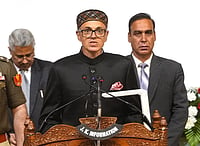"What can art bring to our dark age?" Tel Aviv-based Israeli artist Bracha L. Ettinger said while resigning as a member of the finding committee for the German art exhibition documenta 16. Four other members and curators of what is recognised as the world’s most prestigious exhibition resigned as well over the political climate in Germany around the war in Israel and Gaza that "made it impossible to stage an art show that allows diverse perspectives, perceptions and discourses".
'No Space In Germany For Open Exchange Of Ideas': After Hoskote, All Documenta Exhibition Panel Members Resign
The members said that they do not believe Germany currently has a space for an open exchange of ideas and the development of complex and nuanced artistic approaches that Documenta artists and curators deserve.

Documenta is one of the world’s biggest exhibitions of contemporary art, which takes place every five years at Kassel in Germany. The 16th edition of Documenta was scheduled to be held in 2027. But now, the breakup of the committee meant the start date for Documenta’s next edition may have to be pushed ahead.?
At least 11,470 Palestinians —two-thirds of them women and minors— have been killed since the war began, according to Gazan health authorities. Some 1,200 people have been killed in Israel, mostly during the initial attack by Hamas on October 7 and around 240 were taken captive by militants.?
Spate of resignations
In her resignation letter, Ettinger said she had been unable to fully participate due to the ongoing conflict and that her requests to delay proceedings for selecting the artistic director for the 2027 edition had been rejected. Although she denies any connection to it, Ettinger’s resignation comes days after Mumbai-based cultural theorist Ranjit Hoskote quit the finding committee, following criticism for signing a letter that compared Zionism and Hindu nationalism.
An article published in Germany’s daily Süddeutsche Zeitung on November 9 accused him of "BDS sympathies and anti-Semitism". The BDS (Boycott, Divestment, Sanctions) movement works to end international support for Israel’s oppression of Palestinians. The German parliament in 2019 passed an unprecedented legislation condemning the BDS, declaring it anti-Semitic and illegal. However, BDS has come to be known for devising peaceful, popular actions to boycott Israel and institutions, organizations, and corporations that are complicit in its crimes against the Palestinian people.?
The aforementioned article referred to a 2019 BDS petition that Hoskote signed against a far-right event on “Zionism and Hindutva,” co-hosted by the Consulate General of Israel in Mumbai.?
In his resignation letter to Andreas Hoffmann, managing director of Documenta, Hoskote said, “These last few days have been among the most deeply distressing days of my life. The monstrous charge of anti-Semitism has been brought against my name in Germany, a country I have regarded with love and admiration, and to whose cultural institutions and intellectual life I have contributed for several decades, as a writer, curator, and cultural theorist.”
Hoskote said those who have “no acquaintance with my life and work have judged, denounced, and stigmatised me on the basis of a single signature on a petition, taken out of its context and not approached in the spirit of reason”.
“I have been written about with harshness and condescension, and none of my detractors has thought it important to ask me for my point of view. I feel, strongly, that I have been subjected to the proceedings of a kangaroo court,” Hoskote said. Most importantly, he noted that criticism of Israel is not antisemitic.?
While Ettinger’s resignation letter doesn’t refer to Hoskote, other museum directors and curators including Simon Njami, Gong Yan, Kathrin Rhomberg and María Inés Rodríguez, resigned saying that the public discrediting of Hoskote in the last few days makes them “very doubtful if this prerequisite for any coming edition of Documenta is currently given in Germany”.
“Art requires a critical and multi-perspective examination of its diverse forms and contents to be able to resonate and develop its transformative capacity,” they wrote adding that while they do understand that Germany has great sensitivity towards all antisemitic tendencies, “this awareness of special responsibilities runs the risk of being misused for opinion politics in order to suppress undesirable approaches and their broad and open discussion”.
The members said that they do not believe Germany currently has a space for an open exchange of ideas and the development of complex and nuanced artistic approaches that Documenta artists and curators deserve.
Referring to the spate of resignations, Hoskote told The Indian Express on Sunday that it shows that Documenta can no longer live up to its reputation “as a forum hospitable to diverse ideas, multiple perspectives, to dialogue among varied positions and a fearless engagement with global urgencies, always amplifying the voices of the marginalized and dispossessed”.
Germany’s crackdown on pro-Palestine artists
The increasing allegations of being ‘anti-semitic’ come at a time when artists, like many others online, are sharing information on the ongoing Israel-Hamas conflict and demanding a ceasefire. However, Germany continues to crackdown on what it says is ‘anti-semitism’.
A German museum cancelled part of an exhibition devoted to 'Afrofuturism' due to guest curator Ana?s Duplan’s pro-Palestine social media posts. While explaining the reason behind doing so, the Museum's Director, Peter Gorschlüter, said that posts that 'do not acknowledge the terroristic attack of the Hamas and consider the Israeli military operation in Gaza a genocide' were 'unacceptable'.
Sharing screenshots of the cancellation email on Instagram, Duplan said he and his studio team were “speechless.” In an interview with Hyperallergic, Duplan further explained that while him and his team have themselves earlier ??disinvited guests from their exhibitions for making anti-semitic statements, “I think the lack of conversation and lack of any effort to really frame a dialogue around antisemitism, around Israel, and around Palestine feels really repressive.”





















